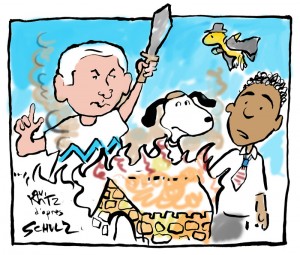
Ilana rolls over and glares at me. “Calm down,” she says. “Your freedoms do not include shouting ‘Fire!’ in a crowded Temple.”
“Ohmigod,” I say. “I had the weirdest nightmare.”
“It must be something you didn’t eat,” Ilana suggests.
“I was a dog,” I say.
“A dog?”
“In a comic strip. And there was this music …”
“This is the fluff of which dreams are made?” Ilana sighs. “Let’s hear it…”
Temple Mount
Oy, Jerusalem
Reading pre-election polls, I used to wonder how a person could intend firmly to vote yet be undecided. If you cared enough to vote, you had to have an opinion. If you didn’t like the candidates, you could still choose the lesser evil – and you were morally obligated to vote for the lesser evil, lest the greater evil win.
I have shed my patronizing attitude. Tomorrow I am supposed to vote for mayor of Jerusalem. I care deeply, and I’m undecided. Indeed, I’m more undecided than I was several weeks ago. I still believe in the obligation to vote for the lesser evil. But which of the major candidates – Nir Barkat or Meir Porush – qualifies for that dubious title?
Let me phrase the dilemma – as my wife did – in terms of risk: There’s an large chance that Porush will fulfill at least some of the the dark predictions of his critics. There’s a slighter lesser risk that Barkat will do what critics fear – but the damage he could cause is much greater. Electing Barkat mayor is akin to hoping that a pyromaniac keeps his matches buried in his pocket.
Southern Exposure: Telling Jerusalem Differently
“Ancient Jerusalem Safari” said the sign on the side of the open-sided bus. It was parked this morning in the lot at the end of the promenade that stretches from UN Hill almost to Hebron Road. The promenade is an arc of stone walkways and stairs, of lawns and landscaping with a view northward of the Old City walls and the Dome of the Rock, which appear just close enough to be reachable, just far enough off to still be the double-page color illustration of the city at the end of the quest that I read about in a childhood book whose name I’ve forgotten but whose story I think I’ve remembered for a moment when I wake from a dream.
The promenade may be my favorite spot in South Jerusalem, partly because of the view and the quiet, partly because both Palestinians and Israelis spend time there. Riding my bike there on a weekday, I’ll pass Israeli joggers and women from Jebal Mukkaber in ankle-length dresses and sneakers out for their health walk. On one park bench I’ll see a young Orthodox couple, on another a young Palestinian couple – both having found a place public enough that it’s not immodest to be meeting there, private enough that they can really talk. In the morning, I usually pass several Jews praying by themselves, facing northward. In the afternoon, I’ll see a Muslim or three, kneeling toward the south. On Saturday afternoons, families from both sides of towns are picnicking and playing soccer. Whole congregations – especially ones that give women a role – come here to pray on the night of Tisha Be’av or at dawn on Shavuot instead of walking to the Western Wall, where the crowds of ultra-Orthodox brook no innovations in worship.
But on the middle days of Pesah and Sukkot, the promenade sprouts moveable police barriers and private security guards.





